The Parallel Forum of 2019 ZGC Forum themed on “Gathering Global Wisdom to Serve the Future: the Voice of Global High-Level Think Tanks” was successfully convened at the Exhibition Center of ZGC Science Park in the afternoon on Oct. 16, 2019.
The parallel forum was sponsored by Beijing Academy of Science and Technology (BJAST), Chinese Academy of Science and Technology for Development (CASTED), Institutes of Science and Development, Chinese Academy of Sciences (CASISD), and National Academy of Innovation Strategy (NAIS) and organized by Beijing S&T Decision-making Consultant Center (BJAST Think Tank). Twenty renowned experts of 6 think tanks from China, Japan, Israel, Russia, Germany and Norway had thorough discussions on the theme “R&D Globalization and High-Quality Transformation”, which provided new ideas, new viewpoints, new thoughts and new perspectives for high-quality development of the capital’s economy and contributed global wisdom to the construction of national science and technology innovation centers. More than 160 experts and scholars, government officials, entrepreneurial representatives and media reporters at home and abroad attended the forum.
Fang Li, secretary of the Party Committee of BJAST presided over the meeting and he firstly extended a warm welcome and heartfelt thanks to the guests present at the forum. Distinguished guests including Du Feijin, member of the Standing Committee and director of Publicity Department of Beijing Municipal Party Committee, Zhang Qin, member of the Standing Committee of CPPCC, former deputy secretary of the Party Group and vice chairman of China Association for Science and Technology (CAST), and Hu Zhijian, director of CASTED attended the forum and delivered speeches.
During Du Feijin’s speech, he put forward four suggestions on building a high-level think tank: firstly, meet the needs of the future and scientifically grasp the development trend. Think tanks should play a leading role in academia, integrate multiple rationalities and value pursuit of disciplines like science and technology and humanities, and combine the development trends of cutting-edge science and technology to deepen international R&D cooperation to promote interdisciplinary collaboration and independent innovation. Secondly, serve national governance and act as a good advisor for decision-making. Think tanks should be issue-oriented and practice-oriented to carry out forward-looking, targeted, and precautionary researches in response to complicated and ever-changing global issues, major national strategic needs, and general concerns of the people, forming a sound interaction with policy-makers and promoting high-quality transformation of think tank research achievements. Thirdly, emphasize the importance of intelligence and encourage cultural exchanges. Think tanks of various fields should actively promote think tank cooperation, be a true friend and messenger in bridging ideas, explaining policies, and facilitating communication with the public, and eliminate misunderstandings and misjudgments through reasonable, effective and useful high-quality results, gather wisdom at home and abroad to add new meanings and perspectives for global innovation and intelligence. Fourthly, gather the strongest brains to exert the radiating driving-force effect. Think tanks should base themselves on China’s practices and grasp Chinese characteristics, gather top intelligence resources, inspire creativity in high-end talents, and introduce the unique contribution of Chinese wisdom and Chinese solutions to the world to constantly enhance international popularity and influence of high-level think tank. Besides, Du Feijin expressed high expectations for the development of BJAST. He pointed out that Beijing have been building the first batch of 14 new-type high-level think tanks since last year. As Beijing’s only high-level think tank in science and technology, the science and technology innovation think tank of BJAST should represent the highest level of Chinese think tanks and rank among the best in the world.
During Zhang Qin’s speech, he pointed out that science and technology think tanks should pay attention to rigorous theories and empirical researches. Firstly, from the aspect of theories, the concept should be concise and the logic should be consistent. At present, in consideration of many major concepts in the scientific and technological field of China need to be further defined, think tanks should conduct more in-depth studies. Secondly, to better serve the government decisionmaking, science and technology think tanks will need the support of data and empirical evidence. Study and formulation of all policies should be based on empirical researches.
During Hu Zhijian’s speech, he mentioned that with a new round of industrial reform having been accelerated, economic globalization entering an adjustment period and international order having changed greatly, new challenges and risks are induced, which imposes higher requirements and responsibilities for scientific innovation in the new century. As a research institution for science and technology policy and strategy directly led by the Ministry of Science and Technology and one of the national incubators for top think tanks, CASTED will strengthen exchanges and cooperation with our fellow think tanks at home and abroad, constantly seek consensus, and provide new perspectives, ideas and wisdom for global innovation and development.
The forum invited many experts to deliver keynote speeches on major issues, such as global layout of scientific and technological resources, forward-looking basic researches, leading original innovation, cultivation of emerging industries, formation of future industries, and in-depth open innovation. Experts include Zhang Xiaoqiang, deputy managing director-general and director of the executive board of China Center for International Economic Exchanges (CCIEE); Guo Guangsheng, president of BJAST; Kazuki Okimura, former president of Japan Science and Technology Agency (JST) and chief researcher of JST China Research and Communication Center (CRCC); Lyu Wei, researcher of Development Research Center of the State Council; Mu Rongping, secretary of the Party Committee of CASISD; Alexander Nikolaevich Shiplyuk, director of Institute of Theoretical and Applied Mechanics, Russian Academy of Sciences, and corresponding member of Russian Academy of Sciences; Zhao Zhiyun, Party Committee secretary of Institute of Scientific and Technical Information of China (ISTIC); Hideyuki Tsunoda, deputy director-general of National Institute of Science and Technology Policy (NISTEP) of the Ministry of Education, Culture, Sports, Science and Technology (MEXT). With regard to R&D globalization and high-quality transformation of achievements, several experts at home and abroad had in-depth and extensive dialogues, triggering a wonderful and intense collision of thoughts and presenting a high-level feast of ideas to participants. The experts participated in the discussion include Weng Qiwen, deputy director of Administrative Committee of Zhongguancun Science Park (Z-Park), Shi Qian, director of Shanghai Institute for Science of Science (SISS), Li Zhijian, director-general of Asia-pacific Innovation Economic Research Institute of Guangdong (APER), Ronnie Bertasman, executive member of Israeli Innovation Agency Research Council, director of College of Electronic Engineering and Computer Science of Israel Institute of Technology, Haruko Yoneyama, deputy director of JST China Research and Sakura Science Center (CRSC), Michael Mark, academic research director of Nordic Institute for Studies in Innovation, Research and Education (NIFU), Torben Schubert, deputy director of Department of Innovation and Knowledge Economy of Capacity Center of Fraunhofer Society Systems and Innovation Research (ISI).
Moreover, Guo Guangsheng, president of BJAST, made a keynote speech on "Grasping the trend of R&D globalization to promote high-quality economic development". He summarized six features, namely globalization of scientific and technological innovation, and strong international technology flow, the increasing importance of innovation research, increasing density of international cooperation network, the reformation of the global value chain, and the speeding up of the flow of high-end talents, and called for well management of four relations, namely the relation between open innovation and independent innovation, between core technology and peripheral technology, between disruptive technologies and the cultivation of emerging industries, and between R&D globalization and innovative ecological environment. He also proposed four strategic routes on promoting high-quality development of economy, namely consolidating the foundation of R&D globalization, creating international scientific and technological cooperation network, seizing the commanding heights of scientific and technological innovation, and cultivating global high-end industries.
At the Forum, Zhang Shiyun, deputy director of BJAST Think Tank and Party secretary of Beijing Research Center for Science of Science released the “Research Report on Function Evaluation of Beijing, Shanghai and Shenzhen as Science and Technology Innovation Centers” on behalf of Beijing S&T Decision-making Consultant Center (BJAST Think Tank). This research focuses on the three “science and technology innovation centers” in Beijing, Shanghai and Shenzhen, and the five functional frameworks of “agglomeration, originality, driving, radiating, and leading”. According to this report, the functional comprehensive indexes of the science and technology innovation centers in Beijing, Shanghai and Shenzhen showed an overall trend of growth from 2013 to 2017, with Beijing ranking the first, Shenzhen the second and Shanghai the third respectively. From the functional comprehensive indexes, Beijing ranked the first in terms of agglomeration, originality and radiating functions. Shanghai ranked the second in terms of four function indexes of agglomeration, originality, driving and radiating, and the overall development of Shanghai was relatively balanced. Shenzhen ranked the first in term of driving and leading function index. From the five functional comprehensive indexes, Beijing highlights the concept of innovation serving the national strategy, the distinctive features as a capital and remarkable achievements; Shanghai has made great progress in developing an export-oriented economy. Shenzhen continued to lead in the high-tech industry.
At the end, President Guo Guangsheng delivered a closing speech of the forum, with thanks, review and summary. He pointed out that the forum had the following characteristics: firstly, high starting point and large scale. ZGC Forum is positioned as a national platform and an international forum. As an important part of 2019 ZGC Forum, the Parallel Forum of Global High-Level Think Tanks discussed the theme of R&D globalization and high-quality development, in line with the orientation of ZGC Forum as a global pioneer in innovative ideas, concepts and technologies, and acted as a concrete measure of BJAST to implement the strategy of strengthening China through science and technology in the field of high-end think tank and participate in the building of national science and technology innovation centers; secondly, multiple dimensions and practical achievements. The forum addressed not only macro issues in R&D globalization and high-quality development, such as governance and systems, but also microscale issues, such as management and practices. The experts discussed the theme and put forward a lot of effective and forward-looking suggestions, which are very inspiring for Beijing to further promote the building of science and technology innovation centers with global influence. Beijing Decision-making Consultant Center (BJAST Think Tank) has published “Research Report on Function Evaluation of Beijing, Shanghai and Shenzhen as Science and Technology Innovation Centers” to provide timely policy suggestions for promoting the establishment of China’s high-level innovation platforms in the new era; thirdly, wide-ranging influence and profound significance. The forum has attracted wide attention at home and abroad, pushed forward international cooperation between high-end think tanks, enhanced the exchange of policies and experience, and contributed Chinese wisdom and strength to global governance innovation.
Think tank resources are precious resources of a country and a nation. Since the 18th National Congress of the Communist Party of China (CPC), the CPC Central Committee and the State Council have made a series of important arrangements on building new-type think tanks with Chinese characteristics and establishing a sound decision-making and consulting system, have demonstrated the positioning, mission, direction, path, overall pattern, and development concepts of China's think tank development. The development of China's think tanks has ushered in a precious period of historic opportunities. Centering on new missions, new requirements and new tasks for current technological development, the Parallel Forum of 2019 ZGC Forum themed on “Gathering Global Wisdom to Serve the Future: the Voice of Global High-Level Think Tanks” aims to plan and promote the development of national science and technology innovation centers from a global perspective, which facilitated collaboration and effective interaction among global wisdom and provided international experience and policy reference for Beijing to build science and technology innovation centers with global influence, and will be beneficial to the construction of national science and technology innovation centers.

The meeting scene
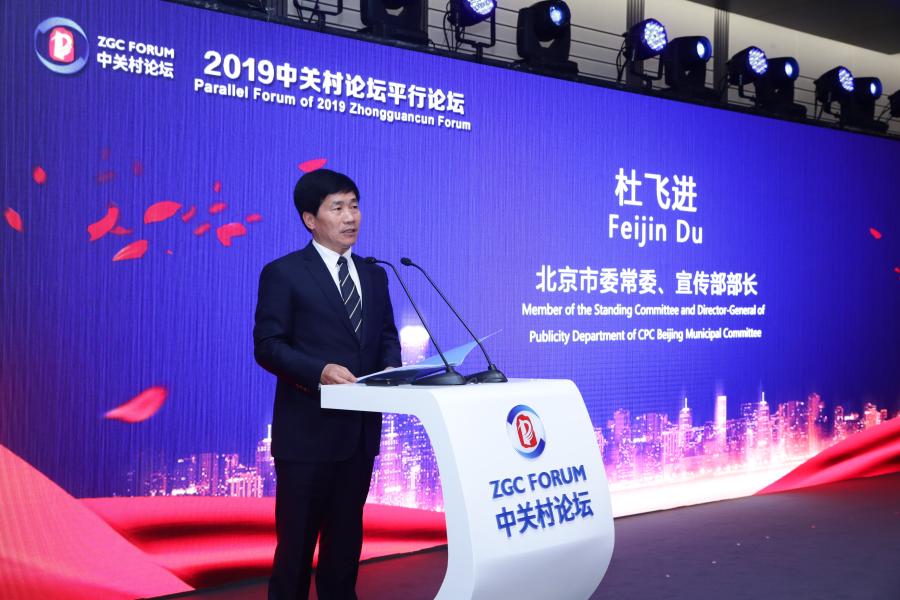
Du Feijin delivered a speech
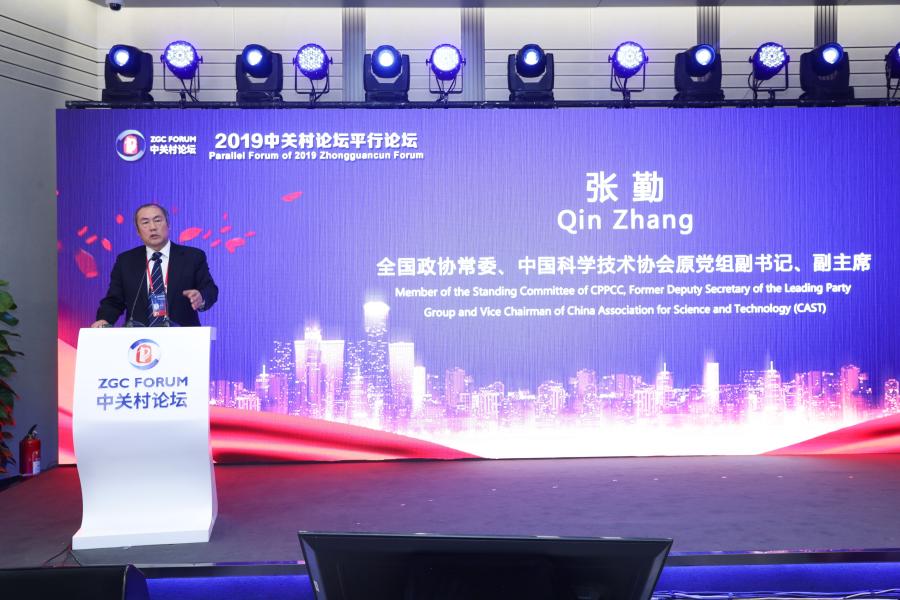
Zhang Qin delivered a speech
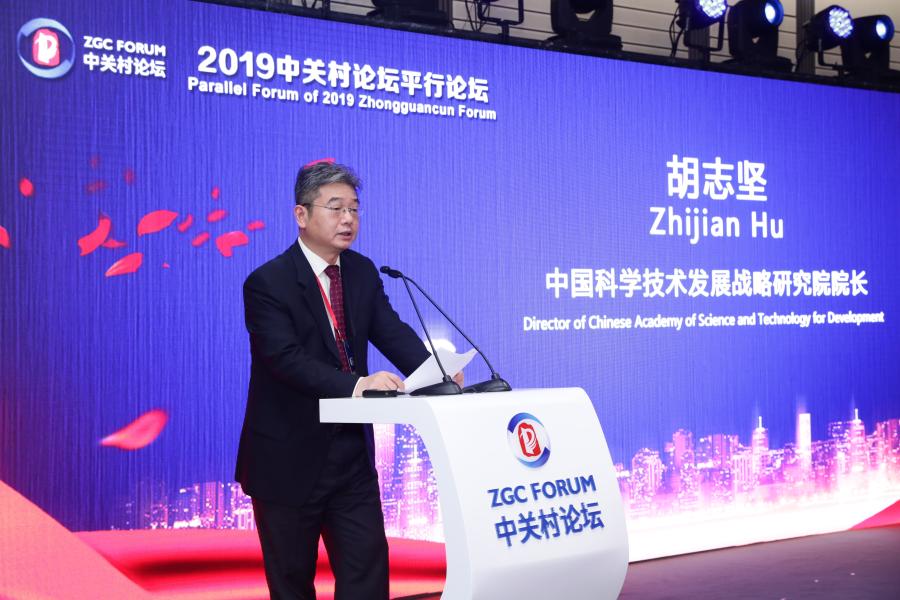
Hu Zhijian delivered a speech
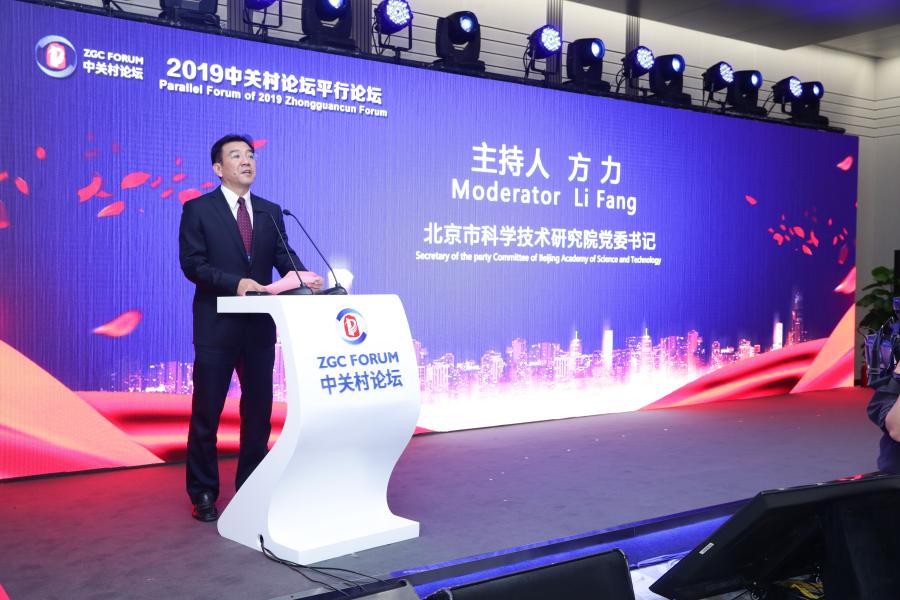
Fang Li presided over the forum
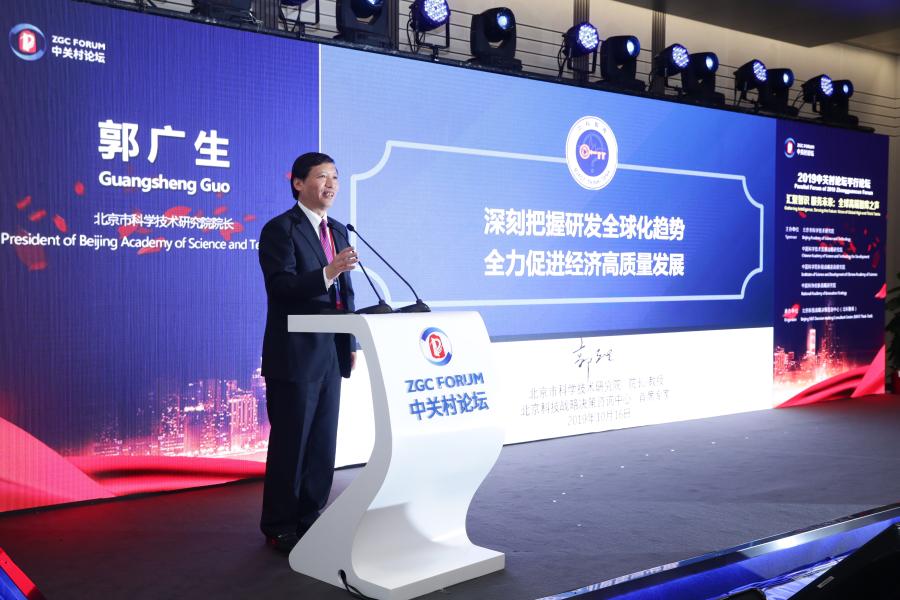
Guo Guangsheng delivered a keynote speech
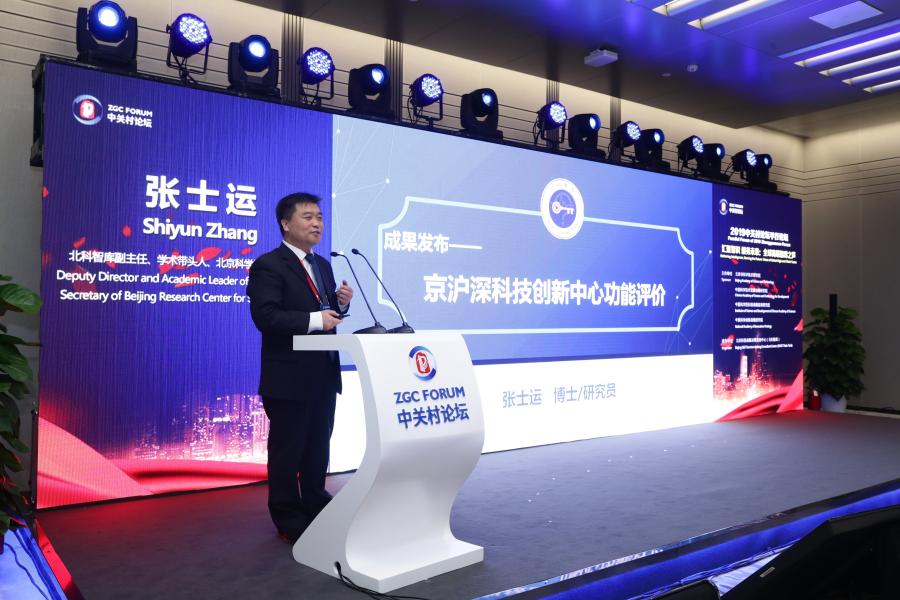
Zhang Shiyun announced crucial achievements
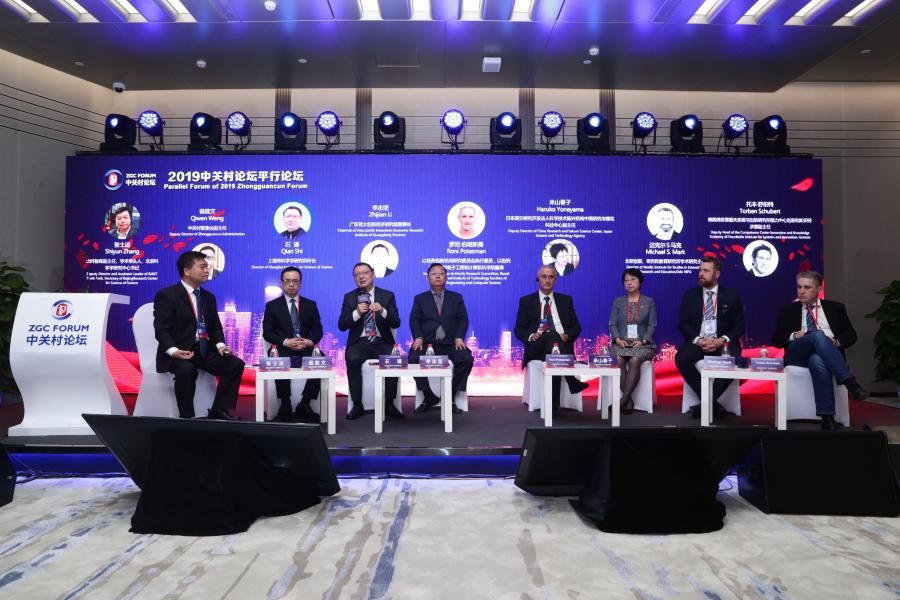
High-Level Dialogues
(Text by Zhang Yang; Photographs by Chen Yuanyuan)